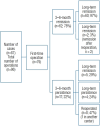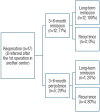Medium and Long-Term Data from a Series of 96 Endoscopic Transsphenoidal Surgeries for Cushing Disease
- PMID: 38449382
- PMCID: PMC10924914
- DOI: 10.3340/jkns.2023.0100
Medium and Long-Term Data from a Series of 96 Endoscopic Transsphenoidal Surgeries for Cushing Disease
Abstract
Objective: Postoperative data on Cushing's disease (CD) are equivocal in the literature. These discrepancies may be attributed to different series with different criteria for remission and variable follow-up durations. Additional data from experienced centers may address these discrepancies. In this study, we present the results obtained from 96 endoscopic transsphenoidal surgeries (ETSSs) for CD conducted in a well-experienced center.
Methods: Pre- and postoperative data of 96 ETSS in 87 patients with CD were included. All cases were handled by the same neurosurgical team between 2014 and 2022. We obtained data on remission status 3-6 months postoperatively (medium-term) and during the latest follow-up (long-term). Additionally, magnetic resonance imaging (MRI) and pathology results were obtained for each case.
Results: The mean follow-up duration was 39.5±3.2 months. Medium and long-term remission rates were 77% and 82%, respectively. When only first-time operations were considered, the medium- and long-term remission rates were 78% and 82%, respectively. The recurrence rate in this series was 2.5%. Patients who showed remission between 3-6 months had higher longterm remission rates than did those without initial remission. Tumors >2 cm and extended tumor invasion of the cavernous sinus (Knosp 4) were associated with lower postoperative remission rates.
Conclusion: Adenoma size and the presence/absence of cavernous sinus invasion on preopera-tive MRI may predict long-term postoperative remission. A tumor size of 2 cm may be a supporting criterion for predicting remission in Knosp 4 tumors. Further studies with larger patient populations are necessary to support this finding.
Keywords: Complete remission; Neuroendoscopy; Pituitary-dependant Cushing syndrome; Treatment outcome.
Conflict of interest statement
No potential conflicts of interest relevant to this study exist.
Figures




Similar articles
-
Outcomes of endoscopic transsphenoidal surgery for Cushing's disease.BMC Endocr Disord. 2021 Mar 3;21(1):36. doi: 10.1186/s12902-021-00679-9. BMC Endocr Disord. 2021. PMID: 33658018 Free PMC article.
-
Retrospective analysis of the outcomes of endoscopic transsphenoidal surgery for Cushing's disease.Surg Neurol Int. 2024 Jul 12;15:240. doi: 10.25259/SNI_278_2024. eCollection 2024. Surg Neurol Int. 2024. PMID: 39108389 Free PMC article.
-
Impact of tumor characteristics and pre- and postoperative hormone levels on hormonal remission following endoscopic transsphenoidal surgery in patients with acromegaly.Neurosurg Focus. 2020 Jun;48(6):E10. doi: 10.3171/2020.3.FOCUS2080. Neurosurg Focus. 2020. PMID: 32480366
-
Efficacy of endoscopic transsphenoidal surgery for cushing's disease: Case series and review of the literature.Neurol India. 2020 Mar-Apr;68(2):403-406. doi: 10.4103/0028-3886.284363. Neurol India. 2020. PMID: 32415015 Review.
-
Neurosurgical treatment of Cushing disease in pediatric patients: case series and review of literature.Childs Nerv Syst. 2019 Nov;35(11):2127-2132. doi: 10.1007/s00381-018-4013-5. Epub 2018 Nov 28. Childs Nerv Syst. 2019. PMID: 30488233 Review.
References
-
- Acebes JJ, Martino J, Masuet C, Montanya E, Soler J. Early post-operative ACTH and cortisol as predictors of remission in Cushing’s disease. Acta Neurochir (Wien) 2007;149:471–477. discussion 477-479. - PubMed
-
- Aranda G, Enseñat J, Mora M, Puig-Domingo M, Martínez de Osaba MJ, Casals G, et al. Long-term remission and recurrence rate in a cohort of Cushing’s disease: the need for long-term follow-up. Pituitary. 2015;18:142–149. - PubMed
-
- Araujo-Castro M, Acitores Cancela A, Vior C, Pascual-Corrales E, Rodríguez Berrocal V. Radiological Knosp, revised-Knosp, and Hardy-Wilson classifications for the prediction of surgical outcomes in the endoscopic endonasal surgery of pituitary adenomas: study of 228 cases. Front Oncol. 2022;11:807040. - PMC - PubMed
LinkOut - more resources
Full Text Sources

